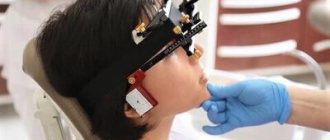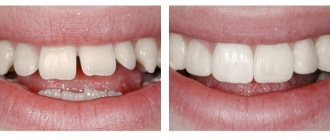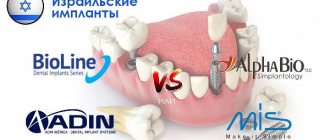A little bit of history
Tooth loss has occurred in people at all times. The first attempts to restore implants were noted in ancient times.
The initial goal of such procedures was to restore the functional abilities of the jaws. The first artificial teeth were inserted only during meals, because... were practically not fixed on the jaw.
To carry out procedures, people used improvised means - wood, metal, teeth of animals and other people.
In the 19th century, the first intraosseous implants appeared, which served as the basis for modern products.
The concept of an implantologist appeared only at the beginning of the last century. Today, this branch of dentistry is very developed and has a wide range of artificial implants that are highly aesthetic.
Competence and Responsibilities
A dentist-implantologist can only be a certified specialist who has completed the necessary training in this field.
The required knowledge of this doctor includes:
- Human Anatomy and Physiology;
- Structure of the skull and jaw apparatus;
- Have knowledge and experience in dental surgery;
- Complete training in dental implantation;
- Ability to work with dental instruments and equipment;
- Know about the compositions and effects of medicines (especially anesthetics);
- Have diagnostic skills;
- Be able to read x-rays.
An implantologist restores lost teeth by implanting artificial roots, on which a prosthesis will subsequently be installed.
His competence includes the following dental defects in a patient:
- Single absence of elements of the jaw arch. In this case, there are neighboring teeth that can serve as a support for prosthetics, or may remain unaffected.
- Missing teeth on one or both jaws. In such a situation, removable or non-removable structures are used.
Modern developments in implantology make it possible to restore any defects.
Reason to contact a specialist
A consultation with an implantologist is usually prescribed by other specialists - a therapist, surgeon or orthodontist. In rare cases, patients independently make an appointment with this doctor.
Despite the active development of this area of dentistry, people resort to the services of an implantologist only in extreme cases.
The reason for contacting a specialist is the need to restore one or more teeth using implants.
An implantologist corrects the following defects:
- Loss of a tooth in any part of the mouth;
- Loss of several units of dentition;
- The absence of units that could become supporting when fixing the bridge;
- Adentia (complete absence of teeth);
- Inability to install a removable denture (allergies, gag reflex, intolerance to components);
- Development of bone tissue atrophy in the crest area, making it impossible to use removable dentures;
- Patient's reluctance to wear removable structures;
- Functional occlusion (pain when closing).
Implantation in these cases is possible only in the absence of direct contraindications:
- Anemia and blood diseases;
- Diabetes;
- Hypertension and heart failure;
- Oncological pathologies;
- Immune diseases;
- Infections;
- Mental disorders.
Is it really possible to carry out dental implantation for hepatitis, and what methods are used?
Visit here to learn more about Harvest Smartprep technology for dental implants.
We will tell you about this address https://zubovv.ru/implantatsiya/metodiki/populyarnyie-alternativyi.html what an alternative to dental implantation exists.
In what cases should you visit this specialist?
Other doctors most often refer you to a specialist in the field of implantology: surgeons, dental therapists or orthodontists.
The rapid pace of development of implantology is still often ignored, and implantation is resorted to only in cases where there are indications for it. The procedure, of course, can be carried out at the request of the patient, when there are no contraindications from his body.
It is important to know: To carry out such an operation, careful preparation is required, including examination of the patient’s entire body.
The main problems that implantology solves are the following:
- Absence of one dental organ in any part of the oral cavity.
- Loss of several teeth at once in any area.
- In the absence of teeth, which should become a support for the installation of bridges or removable structures.
- With edentia, when teeth on one or two jaws are missing altogether.
- Inability to wear removable dentures due to the presence of a gag reflex or intolerance to the compositions used to make such structures.
- Severe atrophy of the bone crest, when it is impossible to fix a removable denture well on the lower jaw.
- If the patient has no desire to wear removable structures.
- The presence of functional occlusion (pain when closing the jaws).
It is worth noting that if the patient has one of the listed problems, the doctor will not always recommend implantation. He can refuse it if the patient has at least one of the contraindications: diabetes mellitus, diseases of the thyroid gland, cardiovascular or bronchopulmonary systems, a malignant tumor, and so on.
Implantation is also not available for local contraindications: destruction of several teeth by caries, poor condition of the mucous membrane where the implant is planned to be installed and insufficient cleanliness of the oral cavity. In such cases, you need to first eliminate these problems and then proceed with the operation.
Initial consultation
During the initial consultation, the doctor conducts a visual examination of the oral cavity, assesses its general condition and identifies defects. A survey is conducted about the causes and timing of tooth loss, hereditary diseases and existing pathologies.
To assess the patient’s general condition and identify direct contraindications, tests are prescribed:
- General and biochemical blood test;
- Checking blood clotting;
- Tests for HIV, syphilis, hepatitis and diabetes.
To draw up a treatment plan and choose a recovery method, you must undergo the following examinations:
- Ultrasound to evaluate the functions of the salivary glands and lymph nodes.
- Computed tomography allows you to create a general idea of the structure and condition of the patient’s teeth, roots and gums.
- A panoramic photograph provides information about the volume and condition of the bone tissue of the jaw arches and the location of the roots of the teeth.
- An occlusiogram allows you to assess the nature of the contact between the upper and lower jaws.
A complete examination allows you to assess the possibility of implantation and choose the appropriate treatment method.
How to become an implantologist. Complete course for beginners. (Courses, Implantology)
This seminar will be of interest to those dentists who want to start a surgical practice, as well as those who want to be confident in the results of their operations and increase the profitability of a surgical appointment. Here you will find answers to questions such as: Where to start?, How to choose the right first patient so that the operation is 100% successful. How to correctly distribute the budget allocated for organizing an office and purchasing instruments? Legal support for a surgical patient, documentation of a surgical appointment, etc.
Program
First day: Theoretical part
- Basics History of Dental Implantology
- Structure and physiology of bone tissue
- Types of bone tissue
- Types of implants
- Osseointegration
- Biomechanics
- The structure of a modern implant
- History and questionnaire
- Rules of speech
- Equipment selection
- Carrying out anesthesia
- Agreement with the patient
Second day: Practical part
- "Pitfalls" of X-ray diagnostics. Interactive solution of clinical problems. In modern dental clinics, an implant surgeon is a key specialist in X-ray diagnostics. Inaccuracies in the preliminary diagnosis may lead to changes in the entire treatment plan. A comprehensive and correct dental treatment plan is the key to the success of implantation.
- Errors when choosing the implant position. Coincidence or pattern? What mirages await all of us when installing an implant?
- Demonstration by the lecturer and independent installation of 3 implants. All practical stages are carried out in compliance with aseptic rules.
Operation:
- Carrying out anesthesia
- Incision, detachment of the mucoperiosteal flap
- Holding the flap with a rasp and suture material
- Alveolar ridge smoothing
- Selecting implant positions
- Working with pilot cutters
- Primary control of implant positions
- Correction of pilot drills
- Working with finishing cutters
- Working with a cortical cutter
- Implant installation
- Suturing the wound
- X-ray control
- Installation of gingival cuff formers
Methods used for work
Any type of dental treatment requires compliance with all necessary stages and technologies.
The implantation procedure can be carried out using different methods, the choice of which determines the further course of action.
Preparation
Implantation requires a careful preparatory stage. The result of future treatment depends on the quality of preparatory measures.
The mandatory list of preparation steps also includes:
- ECG for patients with heart failure.
- Allergy tests for an anesthetic drug.
- Sanitation of the oral cavity and professional teeth cleaning.
If any pathologies are detected, the implant dentist sends the patient for consultation to specialists for treatment.
These measures eliminate the possibility of complications developing during the implantation procedure. Consequences may include cardiac arrest, a severe allergic reaction, or the development of an inflammatory process.
At the stage of preparation and treatment planning, the doctor must have a conversation with the patient. Important questions are:
- What are the implantation methods?
- Types of implants;
- How is the implantation procedure performed?
- How quickly does wound healing occur?
- What types of prostheses are there?
- When is the prosthesis installed?
Together with the patient, the doctor selects the most suitable treatment option and type of artificial products. In this case, all the structural features of the patient’s jaws, his wishes and financial capabilities are taken into account.
Implantation methods
Treatment methods and tactics in dentistry are constantly being improved. This also applies to the implantology industry.
Today, you can restore the beauty and functionality of your teeth in almost one visit to the doctor. But the proven classic method of step-by-step recovery is still in demand.
Main methods of treatment:
- Two-stage implantation is a classic and time-tested method of restoring lost teeth.
It involves carrying out the prosthetic procedure only after the artificial root has completely engrafted. This requires waiting from 3 to 6 months. A prerequisite for this method is the suitable condition of the bone tissue. Very often it is necessary to first undergo a bone augmentation procedure or sinus lift. - The one-step method allows you to restore lost teeth in 1 day.
It is very popular because... combines several treatment protocols at once, allows immediate full load on the prosthesis and does not require a long recovery period. This method is often used for edentulous patients. The most basic varieties of the method can be called all-on-4 and all-on-6.
With any treatment method, the implantation procedure is performed under local anesthesia. During its implementation, the patient feels virtually no pain. The duration of the procedure is from 1 to 2 hours.
After its completion, it is necessary to take an x-ray to ensure that the artificial root is installed correctly.
With the two-stage method, the patient is prescribed the following examinations. After the sutures are removed, a gum former is installed, and after complete healing, an abutment is installed.
Prosthetics
Installation of the prosthesis is the last step in treatment. It can be installed immediately after implantation of the artificial root in a one-step procedure. With a two-stage method - only a few months after complete tissue healing.
The main stages of prosthetics are:
- Obtaining casts of the jaws;
- Manufacturing of prosthesis;
- Fitting and modification;
- Fixation.
Compliance with all doctor’s recommendations and careful oral hygiene ensures successful treatment and long service life of the restored teeth.
Structural characteristics of individual titanium abutments and indications for their use.
In this article we will discuss how dental implant failure occurs.
Here https://zubovv.ru/implantatsiya/metodiki/napravlennoy-kostnoy-regeneratsii.html find out how much guided bone regeneration costs.
What questions to ask your doctor before implantation?
You have decided to get an implant. But how to choose a doctor and the right treatment option if there is a lot of conflicting information on the Internet, and the advice of friends and colleagues sounds unconvincing? The right decision: go to an implantologist for a consultation on your own and understand how to correctly ask the right questions and get honest answers, so that during the treatment process you can control not only its progress, but also your own expenses.
Before your appointment
Before you get an appointment with a doctor, you will have to communicate with the administrator. You can check with the clinic administrator for the following:
- Which clinician should I make an appointment with to get a consultation on implantation?
- Does the clinic have the necessary diagnostic equipment for the examination required for implantation?
- How much does a consultation and diagnosis cost?
- Will there be a written treatment plan?
Do not try to get answers to medical questions from the clinic administrator, do not confuse yourself - this is not a doctor.
Who should I sign up with?
It often happens that different doctors are involved in the complete restoration of a tooth: an implant dentist (he installs the implant directly) and an orthopedic dentist (he places a crown on the implant). And if this is so, then at the treatment planning stage, you need consultation from both.
If you decide to install an implant, be prepared for the fact that in the clinic you choose you will have to meet both a dental hygienist (removes plaque and tartar) and a dental therapist (treats caries). To draw up a treatment plan, you will definitely be sent for diagnostics (computed tomography) to see the condition of the bone and other tissues surrounding the teeth. It is possible that you will need to consult an orthodontist (corrects the bite) and a periodontist (treats the tissues surrounding the tooth), but not everyone needs this.
At your appointment, ask your doctor which stage he is responsible for. Take a notepad with you, ask the doctor to write or write down for him: what conclusions he made and how this relates to your further treatment. There will be a lot of information, it will be impossible to remember.
Try to choose a clinic whose specialists carry out all stages of treatment, so if controversial issues arise, it will be easier for you to understand.
Repeated consultation
Be prepared for the fact that after your first visit to the clinic, you will have even more questions. This is fine. Moreover, it is possible that if you go to a neighboring clinic for a consultation with another doctor, you will hear the opposite opinion on your situation. Don't be alarmed, this is normal too.
When you decide on the clinic where you want to receive treatment, sign up for a second consultation. Here you will discuss the financial treatment plan in detail.
You are a serious patient
If you take your health seriously, then before going to the doctor, write down the questions you want to ask the implantologist or orthopedist. And at the actual appointment, write down the doctor’s answers.
Questions for the implantologist:
- What experience do you and your colleagues who will treat me have? What complications did you encounter, and how did you overcome them?
- What studies, including what tests and where will need to be done so that the doctor receives all the necessary information for successful implantation?
- How long will the treatment take? What stages and approximately in what time frame will I have to go through them?
- Are there allergies to implants?
- Is it painful to have implants installed? Will I have swelling after surgery?
- Is it possible to install an implant at the same time as tooth extraction?
- What types of implants does the clinic use? Are these implants suitable for my case? Where can I read reviews about implants from this brand?
- What is the service life of implants?
- If the implant does not take root, who pays for re-installation? What alternative will I have to implantation if I do not want to have the implant re-placed?
- If the test results indicate that bone grafting will be needed but the process is not successful, who pays to try again? If I no longer want to have bone grafting (bone augmentation), what alternative do you suggest?
- What happens to implants in the event of injury or illness?
- What is the schedule and cost of further implant maintenance?
- How to care for implants and the oral cavity in general after installation?
Questions for the orthopedist:
- What experience do you and your colleagues have?
- Do I have an alternative to implantation?
- What are the most common complications you have encountered with implant prosthetics?
- Is it possible to install crowns immediately after implantation?
- Can you be allergic to crowns?
- How long will it take to install a crown, and how many visits are required?
- Is this procedure painful?
- Will there be pain after installing a crown?
- What problems may arise when installing crowns?
- What material will the crown for my implant be made of?
- If the crown chips, who pays for the repair?
- Will it be obvious that I have not a natural tooth, but an artificial one?
- How to take care of your oral cavity so that crowns look like natural teeth and last a long time?
By asking the right questions during your consultation and receiving answers to them, you will form your opinion about whether implant prosthetics is suitable for you as a treatment option. And after listening to the doctor’s answers, form an opinion about his professionalism and decide whether you can trust him.
Vasily Nikolaev
Criteria for choosing a doctor
The success of treatment largely depends on the professionalism of the doctor. A good specialist in the field of implantology can be identified already at the first consultation.
On your first visit, you should pay attention to the following points:
- The doctor should ask the patient about existing and past diseases, as well as heredity.
- When examining the oral cavity, the specialist must invite other doctors - periodontist, orthodontist, surgeon. This allows you to get a complete picture of the condition of your oral cavity.
- Only after receiving a panoramic image of the jaws will the doctor have a complete understanding of the condition of the bone tissue and the location of the root system.
- All actions, treatment plan and timing of procedures are discussed with the patient.
To convince yourself of the professionalism and high qualifications of the doctor, you can ask him about the availability of diplomas and certificates.
Useful tips for patients
Removal or loss of teeth always leads to changes in the structure of the jaw apparatus:
- The bite changes. The teeth begin to shift, resulting in increased stress on the peri-labial tissues and front teeth. Gaps appear between the teeth, where food debris gets stuck and caries and gingivitis develop.
- In places where teeth are missing, the load is reduced, which leads to bone tissue atrophy.
- Changes in the bite and uneven distribution of the load cause loosening of teeth and their loss.
The longer teeth are missing, the more the jaw apparatus changes. Many processes are irreversible and lead to complete loss of teeth.
If you lose one or more teeth, it is necessary to restore them as soon as possible using implantation. This will avoid complications.
The video provides additional information on the topic of the article.
Reviews
Implantology is one of the most popular branches of dentistry. The specialist must have a wide range of knowledge and skills. The success of patient treatment depends on the qualifications and experience of the doctor.
In the comments to this article, we invite you to share your feedback about the work of an implantologist or your experience of treatment with him.
If you find an error, please select a piece of text and press Ctrl+Enter.
Tags implantation
Did you like the article? stay tuned
No comments yet
How to choose an implantologist?
Dental implantation today is almost an ordinary operation that is performed very often. However, this does not mean that complications are excluded. On the contrary, its popularity has led to the fact that many doctors and clinics pursue exclusively commercial gain, caring little about the patient’s health status, not taking into account possible contraindications, and imposing additional unnecessary services.
It is the dentist implantologist who chooses the implantation technique, implants, and performs the operation.
To avoid encountering such a specialist, you should follow some recommendations when choosing a doctor:
- First of all, you should familiarize yourself with the ratings of doctors and clinics, study patient reviews, and on several resources, so that the current picture is more objective.
- The first consultation at most medical institutions is free, so it makes sense to take the time to see several doctors. Pay attention to how the doctor answers questions, how confident he is in his knowledge and skills, and whether after the initial examination he can offer, in his opinion, the optimal methods for eliminating the problem.
- Please note that the doctor has the appropriate certificates. The operation must be performed by a specialist qualified as an implant surgeon or maxillofacial surgeon.
- Find out about current prices in advance. Some doctors, taking advantage of patients' ignorance, offer unreasonably expensive designs or, conversely, overpriced budget options.
- Check to see if the clinic has the appropriate equipment and its own dental laboratory. Without modern technologies, it is unlikely that it will be possible to successfully carry out such a difficult operation as implantation.
Ask your doctor a few questions
What questions should you ask your doctor at your initial appointment?
A list of preliminary questions might look something like this:
- What implantation systems do you work with, and why specifically with them?
- What preliminary examination will you need to undergo before the operation?
- What is the survival rate for your patients?
- What to do if complications arise after surgery?
- Does the clinic provide a guarantee on treatment results?
- Do you offer a free repeat procedure in case of rejection?
In modern conditions of medical development, there are very few categorical contraindications to implantation, in the presence of which it is completely impossible.
The success of implantation depends on the qualifications and experience of the doctor
In most cases, success depends on the experience and qualifications of the doctor and his ability to choose the right technique, taking into account the individual characteristics and chronic diseases of the patient.









